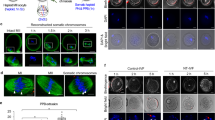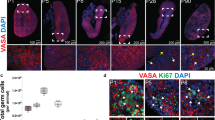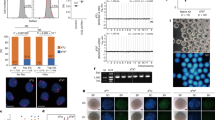Abstract
SPONTANEOUS ovarian teratomas are found in about 50% of strain LT/Sv mice by the time they are 90 d old1. These teratomas result from parthenogenetic cleavage of ovarian oocytes. Some parthenotes reach a developmental stage equivalent to 7 d embryo before they become disorganised and further develop into a teratoma. Since some cleaved ovarian oocytes are accompanied by polar bodies, but others seem to lack them, it was uncertain whether the teratomas derive from oocytes that complete the first meiotic division or from oocytes that cleave mitotically without previous meiotic division.
This is a preview of subscription content, access via your institution
Access options
Subscribe to this journal
Receive 51 print issues and online access
$199.00 per year
only $3.90 per issue
Buy this article
- Purchase on Springer Link
- Instant access to full article PDF
Prices may be subject to local taxes which are calculated during checkout
Similar content being viewed by others
References
Stevens, L. C. & Varnum, D. S. Devl Biol. 21, 364–382 (1974).
Linder, D. Proc. natn. Acad. Sci. U.S.A. 63, 699–704 (1969).
Author information
Authors and Affiliations
Rights and permissions
About this article
Cite this article
EPPIG, J., KOZAK, L., EICHER, E. et al. Ovarian teratomas in mice are derived from oocytes that have completed the first meiotic division. Nature 269, 517–518 (1977). https://doi.org/10.1038/269517a0
Received:
Accepted:
Published:
Issue Date:
DOI: https://doi.org/10.1038/269517a0
This article is cited by
-
MC4R mutant mice develop ovarian teratomas
Scientific Reports (2021)
-
Lack of genetic homozygosity in prepubertal teratomas: divergent pathogenesis distinct from that of teratomas in adolescents
Laboratory Investigation (2020)
-
A parthenogenetic quasi-program causes teratoma-like tumors during aging in wild-type C. elegans
npj Aging and Mechanisms of Disease (2018)
-
Frequent homozygosity in both mature and immature ovarian teratomas: a shared genetic basis of tumorigenesis
Modern Pathology (2017)
-
In-vitro- und In-vivo-Knochenregenerierung durch mesenchymale Stammzellen aus dem Nabelschnurblut
Der Orthopäde (2004)
Comments
By submitting a comment you agree to abide by our Terms and Community Guidelines. If you find something abusive or that does not comply with our terms or guidelines please flag it as inappropriate.



